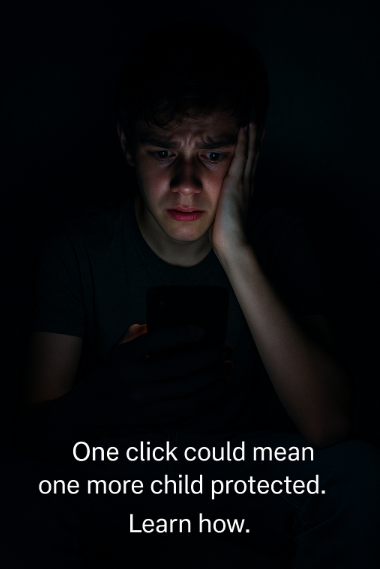Sextortion Is Killing Our Kids, And Shame Is Helping It Win
Sextortion: The Silent Threat Targeting Our Youth, and Why Safe Spaces Matter More Than Ever
It starts with a message.
A new follower. A comment that feels harmless.
A 15-year-old boy, sitting in his room, replies. The conversation feels easy, natural. Compliments. Flirting. A few photos shared back and forth. Then, one photo too far.
Within minutes, everything changes.
The same person who seemed friendly is now threatening to share his photo with everyone he knows unless he pays. The panic hits fast. His stomach drops. His hands shake as he scrolls through messages filled with threats.
He deletes them. Then checks again.
He tries to reason, to plead, but it only gets worse. The fear tightens around him until it’s all he can think about. What will his parents say? His friends? His school?
Shame takes over.
He stops eating. Stops sleeping. Stops talking.
And while his parents think he’s just tired, he’s living in quiet terror.
This story isn’t fiction. It’s real.
It’s happening to thousands of teens right now, in every city, every school, every community.
There’s a growing online threat that’s hitting our youth, and too often, it’s staying in the dark until it’s too late. It’s called sextortion, and while the word might sound sensational, the reality is terrifyingly simple: young people are being manipulated, threatened, and blackmailed by predators online. And it’s happening every day.
What Is Sextortion?
Sextortion happens when someone uses emotional manipulation or threats to pressure another person into sending explicit images, videos, or performing sexual acts online, often under false pretences.
It usually starts on social platforms, gaming apps, or messaging services, where predators pretend to be peers. Once they get a compromising image or video, they flip the script, threatening to release it publicly unless the victim complies further.
It’s not just about exploitation. It’s about control, shame, and silence.
What It Looks Like Today
These aren’t isolated or rare cases. According to the FBI, reports of sextortion involving minors rose sharply in 2023, with over 7,000 victims under age 18, and dozens of confirmed suicides linked directly to online sexual extortion.
Predators often impersonate teens, build fake trust, or use AI-generated images to bait kids into conversations. The entire process can unfold in minutes, and once the threats begin, many victims feel completely trapped.
Why Kids Don’t Speak Up
One of the most dangerous parts of sextortion is how effectively it silences young people. Most victims feel too ashamed or scared to speak out. Some fear they’ll get in trouble. Others think it’s their fault. Many just don’t know who they can trust.
It’s not just about fear of consequences. It’s about the deep belief that no one will understand, and that telling someone will make it worse.
That silence is exactly what predators are counting on.
The Hidden Toll
Sextortion doesn’t stay online, it follows victims into every part of their lives. Once a young person is trapped in that fear, it can spiral fast into anxiety, isolation, depression, or worse.
We’ve seen more and more stories, often shared only after tragedy of teens who took their own lives after being sextorted. They didn’t lack intelligence or support. They lacked a place where they could say what happened without being judged or punished.
That’s the most dangerous gap we’re failing to close.
The Voice Behind the Wake-Up Call
This shocking reality was recently shared with me by my friend, Margot Denommé. Her mission is to protect children’s mental health and safety by helping families understand digital dangers, delay smartphone use until kids are ready, and set healthy boundaries around technology. Through initiatives like Celebrate YOU!, RAADD, and The Family Smartphone Guide, Margot is building a national movement to protect children’s confidence, self-worth, and mental health in a connected world.
Why Safe, Judgment-Free Spaces Matter
This is where programs like The MentorWell come in. At its core, The MentorWell creates real, judgment-free spaces where young people can open up before things hit crisis level.
It’s built on one belief: support should be available before shame settles in.
The MentorWell trains mentors to be listeners, not fixers. It prioritizes safety, confidentiality, and emotional support. That’s exactly what young people need when they’re dealing with something they can’t bring to their parents, friends, or teachers.
We need more spaces like this. And we need them now.
What You Can Do
Whether you’re a parent, educator, or someone who simply cares, here’s how you can be part of the solution:
Talk early, talk often. Let kids know they can come to you without fear of punishment.
Understand the apps they use. Don’t just block or monitor, engage and educate.
Respond with calm, not control. If a young person opens up, reacting with anger or panic will only close them off.
Support programs like The MentorWell. Advocate for mentorship, mental health support, and peer-led spaces in your schools and communities.
If you’re a victim, know this: it’s not your fault. Block the abuser, report the account, and tell someone. You are not alone, and your life is not over.
From Silence to Safety
Sextortion thrives in silence. It counts on shame doing the work so predators don’t have to. But silence only survives where support is absent.
By building safe spaces, real, human spaces where kids can talk, cry, admit, and still feel valued, we flip the script. We shift the power. And we save lives.
This isn’t just an online safety issue. It’s a public health issue. A mental health issue. A human issue.
Let’s stop waiting for tragedy to force the conversation. Let’s start creating the kind of world where kids know: whatever you’re facing, you can talk about it here.


